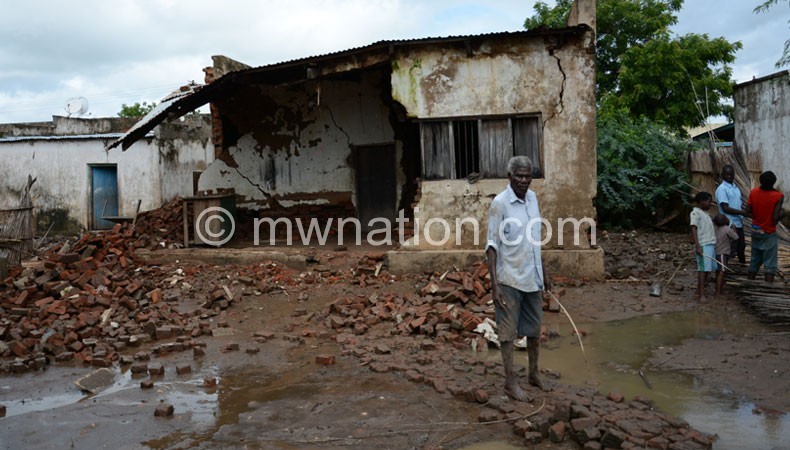Wading in waters waist high to get to class
A team of Unicef and government officials are busy trying to organise flood victims at Chantulo camp. Then, a young teenage girl appears at the camp. She is soaked, visibly weary, but manages to throw herself on a verandah of the only house close to a tent that has become her home for the past 10 days.
Earlier this month, Malawi was hit by devastating floods that left 174 000 people displaced, across 15 districts, mostly in the Southern region. Most children have stopped schooling. 181 schools were literally converted overnight into homes for flood victims.
 A man in his 40’s, Samisoni Damiano, introduces the girl: “That’s my second born daughter arriving from school.”
A man in his 40’s, Samisoni Damiano, introduces the girl: “That’s my second born daughter arriving from school.”
The team later learns, through Damiano, that the 17-year-old girl, Alinafe, is the only pupil remaining at the school. Fourteen of her school mates have withdrawn from class due to the floods that have rendered roads impassable for such children.
“She is in Standard Seven at Phanga Primary School. I am happy because she is always determined to be in class regardless of the circumstances,” Damiano added.
Phanga Primary School sits seven kilometres from Chantulo camp. Within that distance, Alinafe has no choice, but to cover two kilometers of a path covered with muddy water to and from school. Alinafe will have to endure these conditions for at least a month if she is to remain in school. She vows, however to remain in class as long as the road conditions allow her.
“I face so many challenges even during the dry season, but this time it’s worse. I arrive at school dirty, wet and tired. My books are soaked. I dread returning home. Just the thought of walking the same path affects my concentration in class,” says Alinafe.
According to Alinafe, the conditions of the roads have improved in the last few days.
“You are lucky you found the water levels knee-high. If you had come three days ago, you would have struggled because the water levels were waist high, but I was still going to school,” she adds.
Her father Damiano says he knows the danger his daughter is exposed to every morning on her journey to school. He says even when he discourages her from leaving, Alinafe defies her parents and steps out of the tent.
“She insists on going to school. When she can’t make it because of heavy rains, she is angry and won’t talk to anybody. She just loves school,” he discloses.
Sometimes, her father, escorts her a small part of the way to verify the condition of the path. Alinafe finishes at 1pm in the afternoon everyday and walks for about three hours to reach home. Her father makes sure to wait for her at their meeting point so he can accompany her back home. He does this especially on days when the water levels start rising while his child is in class.
“She is hardworking, determined and hungry for education and I have no choice, but to sacrifice a little for her,” said Damiano.
On this day, Alinafe did not take any food in the morning. She ate nothing at school and there are no signs that she will have something to eat before retiring to bed. That has been the story since Damiano and his family relocated to the camp after losing almost everything, including food to the floods.
Alinafe’s mother, Mumderanji, laments the loss of a 50 kilogramme bag of maize to the floods. The flour from the maize could have helped the family for several weeks while hunting for food.Mumderanji has no clue as to where the next meal for the family will come from. It just means, young and hungry Alinafe will have to think of the distance she will have to cover again to make it to class.
Mangochi is a district where education, particularly girls, is lagging behind. Girls face so many challenges to complete their education successfully. Forced or arranged marriages have been a common feature with many of the parents failing to appreciate the importance of education.
Alinafe aspires to be a nurse. Perhaps she will accomplish her dreams. She certainly understands the value of an organisation like Unicef and its commitment to girl’s education. Unicef is now on ground to ensure that school-in-the-box kits reach as many children as possible and improve quality of life in the camps. So far Unicef staff have distributed 813 school-in-the-Box kits to children affected by the floods. A further 50 school tents have been set up for 17 500 affected children.





